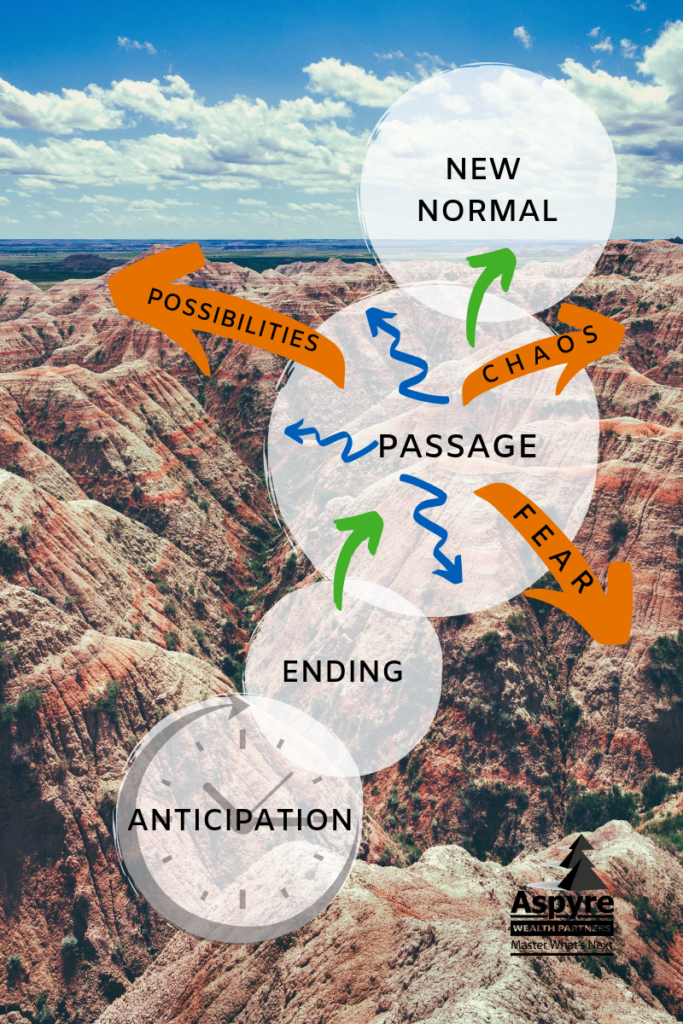“Don’t knock the valleys,” she said. “Everybody wants to be on the mountaintop, but up there the air is so thin, you can hardly breathe— and all you can do is stand still and try not to fall. But in the valley, that’s where the river runs, sweetheart. That’s where all the power is.” Glennon Doyle “Love Warrior”
In our prior post, we discussed how changes in life are inevitable and therefore, should be seen as a gift. As the quote above says, there is power in the valleys. The valleys are where we grow in wisdom and strength.
Thinking of a big life transition as a gift is easiest when you are NOT in the middle of a big transition or change. When you are “in it” as I like to say, there isn’t often much space for self-reflection and self-management. You need a road map. You need to understand where you have been and what is to come.
While no one can predict what the end of a big life change will bring, there are 4 typical stages and these stages are somewhat universal. Understanding the stages in a transition when you are going through a transition can help bring hope and some grounding knowing that the light at the end of the tunnel does indeed exist.
As discussed by Susan Bradley of the Sudden Money Institute, there are typically 4 stages to a big life transition (death of a loved one, divorce, sale of a business, inheritance). They are anticipation, ending, passage, and new normal. Below I have described these stages but it is worth mentioning that sometimes, the first stage of anticipation is not present. This can be quite normal just as it can be quite normal to have a period of anticipation. As I said above, the transition can be hard to predict but the pattern of the stages can be reassuring.
Stages of a Transition
Anticipation
Anticipation is typically the first stage of a major life shift. It has been my experience that this stage can bring quite a bit of anxiety to those that tend to like control and predictability. It is important in this stage that you manage your expectation of yourself. What can you control? What can you not control? What can you monitor? What needs to be managed and what needs to be let go of? You may find that you have to manage the expectation of others as well. It is key in this stage to have statements and language you can use when others ask questions of you.
Ending
Once there is a realization that there is no going back to what was, the ending stage has begun. This can be the start of a transition like with sudden death or it can come after anticipation once the event has occurred and there is an acknowledgment that the only way to move is forward.
 This is often where overwhelm will set in as the present day and future decisions start to mount. When we go through a big upset in our lives, it is common for our decision making to be compromised by the flood of emotions and overwhelm. This is where it is most important to understand what decision must be made now and what decisions can be delayed.
This is often where overwhelm will set in as the present day and future decisions start to mount. When we go through a big upset in our lives, it is common for our decision making to be compromised by the flood of emotions and overwhelm. This is where it is most important to understand what decision must be made now and what decisions can be delayed.
Passage
The ending can last a short amount of time or a long amount of time. You will know you are moving into the passage stage when you start to question what comes next. What does life look like now?
Often this comes with questions around identity if the transition has compromised ones’ identity. “I have been a wife for 40 years and now I am not a wife but a widow. I do not know how to live as a widow.” While passage can be a confusing time for the self, it can also be a time of scenario testing and dreaming. It is time to think about what you want life to look like next.
New Normal
The final stage of the transition is new normal. This is when you start to live that life you played out in Passage. One is in a state of “Flow” – no longer getting hung up in the struggles of the transition.
There can still be hard days/weeks/months but overall you have moved along and the change is behind you. New normal is where you live out the scenarios that were discussed and tested in Passage.
The amount of time it takes to move through the stages is unique to each person and each transition. One should not decide for another or themselves how long each stage should take. Rather, acknowledging that the only way through a transition is through it and do not miss the learning along the way.
Jessi Chadd, M.S.F.S, CFP®, CeFT®, is a Principal at Aspyre Wealth Partners, specializing in life transitions. For help with your specific situation contact Jessi Chadd, at jchadd@aspyrewealth.com (913) 345-1881 or visit our website at AspyreWealth.com. We help successful people Master What’s Next® – whatever phase of life they are in.
Photo by Jordan Whitt on Unsplash
